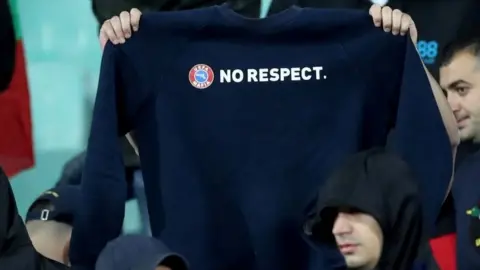
Racism in German football stadiums has become an alarming issue, with incidents against Black players increasing in frequency and intensity. This troubling trend not only tarnishes the image of the sport but also reflects deeper societal issues within Germany. As the nation grapples with this resurgence of racism, football clubs, fan groups, and society at large are forced to confront the underlying causes and explore potential solutions.
The Resurgence of Racism
In recent years, German football has seen an uptick in racist incidents, particularly targeting Black players. This rise parallels a broader shift in the political landscape of Germany, where the rightward tilt in politics has mirrored an increase in racist behavior at football matches. The refugee crisis in 2015 marked a significant turning point, exacerbating xenophobic sentiments and resulting in more frequent racist incidents in stadiums.
Journalist Ronny Blaschke, who has extensively covered racism in football, notes that "racism has become less of a taboo in the stands." The visibility of racism in football is amplified by social media, where Black players face a barrage of derogatory comments and racial abuse. This creates a hostile environment not only for the players but also for fans who oppose such behavior.

Societal Factors and Football's Political Landscape
The political polarization in Germany has seeped into football culture, with stadiums becoming arenas for political expression. Clubs like St. Pauli have embraced a left-wing identity, while others, such as Alemannia Aachen, have been linked—albeit controversially—to far-right ideologies. This division reflects the broader societal tensions, where political allegiances are increasingly visible in the stands.
Football fan culture is complex, with organized groups often demonstrating creativity and unity that surpass traditional political protests. According to DW's analysis, these fans wield significant influence due to their ability to organize and attract media attention, often using pyrotechnics and striking imagery to make their voices heard. However, this influence does not always translate to a broader societal impact, as the entrenched divisions continue to persist.
Club and Fan Group Responses
Football clubs and fan groups have taken a stand against racism, albeit with varying degrees of success. The Schalker Fan Initiative, for instance, has been actively fighting racism since its inception in 1992. Despite their efforts, board member Susanne Franke expresses concern that football culture is regressing to a more intolerant past.
Clubs are increasingly recognizing their responsibility to combat racism, implementing measures to educate fans and promote inclusivity. Initiatives include anti-racism workshops, campaigns, and collaborations with organizations dedicated to fostering diversity. However, the effectiveness of these measures is often questioned, as the persistence of racist incidents suggests a need for more comprehensive strategies.

Broader Implications for German Society
The manifestations of racism in football stadiums are symptomatic of broader societal issues within Germany. The sport's vast reach and visibility make it a powerful platform for addressing these challenges, but they also highlight the deep-rooted nature of racism in society. Football's influence extends beyond the pitch, offering an opportunity to drive cultural and social change if leveraged effectively.
As Germany navigates its political and social landscape, the role of football as both a reflection and a catalyst for change cannot be overstated. The sport has the potential to unite people across divides, fostering a culture of acceptance and understanding. For this potential to be realized, concerted efforts from clubs, players, fans, and governing bodies are essential.
Conclusion
Racism in German football stadiums is a pressing issue that demands urgent attention and action. While clubs and fan groups have made strides in combating this scourge, the persistence of racist behavior in stadiums indicates a need for more robust interventions. Football, with its unparalleled reach and influence, holds the power to effect meaningful change in German society. By addressing the root causes of racism and fostering a culture of inclusivity, the sport can move towards a more equitable future for all its participants.
In the end, the success of these efforts will depend on the collective will of all stakeholders involved in the beautiful game, as they strive to uphold the values of unity, respect, and equality that football fundamentally embodies.